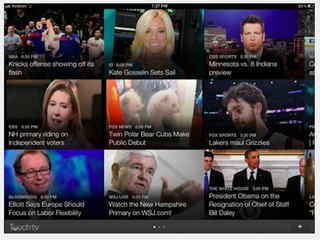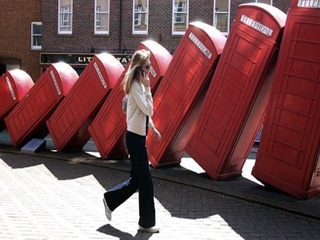Trump rescinds Biden executive order on artificial intelligence
The EO set AI safety and security standards and called for a report on AI's impact on labor
Read more...
I, for one, hate 3-D technology and the ridiculous desire that director have in shoving it into every new action movie out there. I think its kitchy, the glasses are annoying and it just hurts your eyes more than anything else. Thank goodness I am not alone. According to a new survey out in the UK, the majority of the public is not interested in new 3D or mobile TV services, and even less of them are jazzed about TV apps.
Freeview, a UK’s subscription-free digital TV service, surveyed 2,000 UK consumers to find that only 12% of them said they consider mobile TV an appealing service, and a slight 19% thought the same of 3D TV. The concept and functionality of TV apps faired worst of all, with only 6% stating that they were appealing and 8% thinking they were in any way “useful.”
So all though broadcasting marketers that have been trying to find a way to translate their standard television fare using new tech may need to hedge their bets and decide what will really sing to their audience. Past studies have shown that while people do consume a lot of media on their mobile devices, it is much different than the media they consume at home on their big screen TVs or on their laptop. Ooyala released a study several months ago that explained the viewing habits of people are based on comfort and convenience. Most viewers are more likely to watch long movies on their big screen (though some of those screens are hooked up to online content through gaming systems or other services), while shorter clips, music videos or even TV programs are the common fare on mobile devices.
UK programers, marketers and researchers are aiming their sites on how they can use the Olympics to learn viewing habits and spark interest in new tech, especially since this year will be the first year that the games will be broadcast in HD to a mass market in the UK.
Freeview found that set-top boxes or players integrated into smart TV were considered the most exciting new services that have arisen out of the connected TV revolution with roughly 62% showing interest in such offerings.
These findings (which were about the same whether a person considered themselves a tech-enthusiast or not) show that UK consumers are not as wooed by all the changes being forged in the mobile TV or streaming service sector as many would hope, but it does show that what does resonate is personalized TV experiences hooked up to the home entertainment center.
Freeview noted that as of last quarter, its services have overtaken Sky TV, its largest competitor and a Pay-TV provider, by number of active users in the UK. Freeview is currently being used on the main TV sets of roughly 10.8 million homes, compared to Sky’s 10.1 million active base.
Just last week I caught up with the team down at Ooyala, a streaming service platform and anaylitics company, to learn about what they are seeing in the US market and I found that, while consumers are devouring a fair amount of mobile content, they too just want simply great streaming content.
And while Ooyala has been providing companies the services need to deliver, manage, and monetize high quality video content since 2007, last week they launched some new products that personalize the content to the viewer and provide more in-depth analytics for improving future content. Since inception, Ooyala has raised more than $40 million in venture capital for improving the marketplace of video content services online.
This new product, referred to as a tool of content discovery, enables publishers to increase their advertising revenue on multi-screen experiences by tailoring content to the unique viewer.
These types of tailored options for a brand's viewers increases the likelihood that they will remain on the site and discover more content that is enjoyable to them -- thus resulting in more video ads viewed and more revenue dollars.
In pre-release ,with select customers, Ooyala found that the tailored content was already driving a four-fold increase in consumer engagement, meaning longer viewing periods, more videos completed and ultimately improved monetization.
Bismarck Lepe, Ooyala's co-founder and president of products, explained to me that as more people shift the time they are watching video content to online methods, people are going to gravitate to the services that have the best elements of television with the personalized aspects of on-demand viewing.
"With only about 10% of the video viewing population spending a significant amount of time online, the video management field is wide open," Lepe said. "But it is the experience that people are going to compare when they make their choice on what sites they will come back to over and over again."
This may sound similar to advertising experiences, and it is to a degree, but since the video is what brings the consumer to a site and the content that they like is what keeps them their through the commercial, creating a better system of content suggestion and discovery is crucial in improving the online streaming ecosphere.
Companies already using Ooyala technology include ESPN, Victoria’s Secret, Telegraph Media Group, Tennis Australia, The North Face, Rolling Stone, Dell, Sephora and Yahoo! Japan. Headquartered in Mountain View, California,
The EO set AI safety and security standards and called for a report on AI's impact on labor
Read more...The agency also published draft guidance on the use of AI in drug development
Read more...The biggest focus areas for AI investing are healthcare and biotech
Read more...Startup/Business
Joined Vator on
Ooyala is a video technology company that provides an integrated platform enabling the delivery, management, and monetization of high quality video content. Focused on innovation and scalability, Ooyala is committed to providing the most comprehensive video solutions to companies worldwide.Ooyala is headquartered in Mountain View, Ca with sales operations in New York, NY and London, UK.
"Ooyala" means cradle in Telugu, a Southern Indian language. We like the name because it demonstrates what we are doing -- cradling a new form of innovation.
Ooyala was founded in early 2007 by Sean Knapp, Belsasar Lepe and Bismarck Lepe - all former Google employees. While at Google, they worked on the development and launch of various monetization and content distribution products such as AdSense, AdWords and Google Web Search. After four years of engineering and product development at the biggest Internet company in the world, the three left Google to start Ooyala. Ooyala has raised over 10 million dollars in funding and has in excess of 5000 publishers using its syndication platform - Backlot. Ooyala's goal is to build a successful technology company that focuses on delivering the best video experience to video content providers, advertisers and most importantly consumers.






